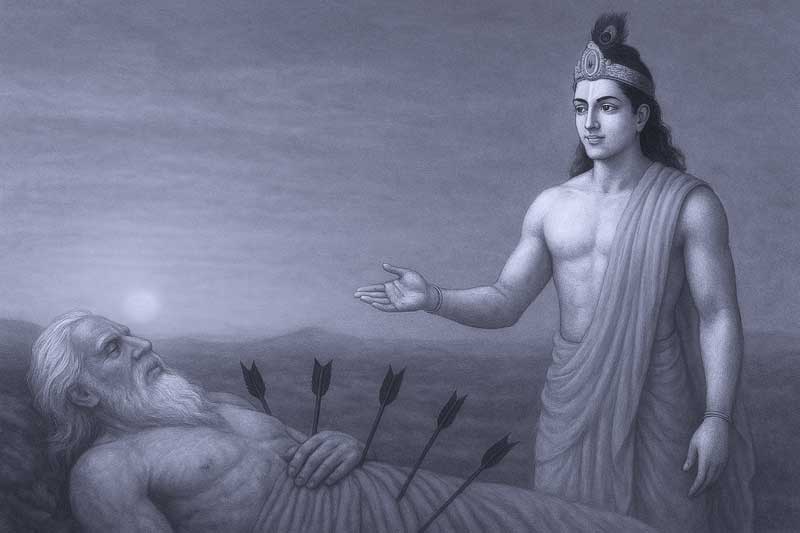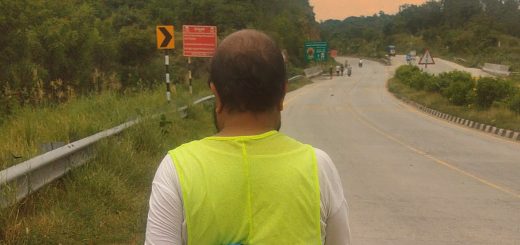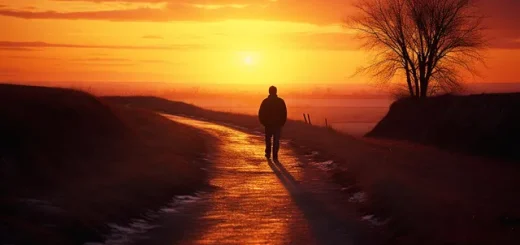Why Our Stories Shouldn’t Die With Us: Inspired by Bheeshma
I never really had a strong desire to write. Whatever happened in my life, I carried it all silently within myself. I never felt like sharing it. But life, in its own way, taught me some harsh lessons. Pain, disappointment, doubt — they were all scattered along my path. At first, I saw them only as burdens. But slowly, I began to realize that within those very pains lay wisdom, and hidden in those experiences was a deeper meaning.
It all began after listening to one profound story in one of his pravachanas from the great Kannada scholar, Shri Bannanje Govindacharyaru.
The story takes us to the days right after the great Kurukshetra war. The war was over. The Pandavas, having gone through fire and blood, were now finally seated on the throne. Dharmaraja ruled as king, guided by the wisdom and support of his brothers. The land was healing. People were slowly returning to their lives, enjoying peace after years of fear and war.
But somewhere else, far from this celebration, an old warrior lay waiting on a bed of arrows — the grandsire Bheeshma. Blessed with “iccha marana” (the boon to choose his moment of death), he had decided to leave this world only in the auspicious period of Uttarayana Punyakaala. Until then, he lay still, arrows piercing his body, yet his mind unwavering — immersed in deep meditation on Lord Shri Krishna.
One day, when the Pandavas were gathered in their palace, enjoying rare moments of joy, Shri Krishna stood apart, silent and heavy with thought. His face bore a concern that could not be hidden. The Pandavas, puzzled and worried, approached him.
“Krishna,” they asked, “why do you not share in our happiness? What weighs so heavily on your heart?”
Krishna exhaled deeply, his eyes distant. After a long pause he spoke,
I see an ocean of knowledge counting his last days…
The Pandavas were still puzzled. They looked at one another, unable to grasp his words.
Krishna continued, “Your grandsire, Bheeshma — a man who holds within him the deepest wisdom of administration, dharma, and spiritual perception — lies waiting for his final moment. If he leaves this world without passing on what he knows, it will be a loss beyond measure for mankind. Generations will remain poor, deprived of his insight.”
The Pandavas listened, their hearts torn between reverence and guilt. For it was they who had fought him. It was by their hands that the mighty grandsire now lay wounded, his body nailed to the earth by arrows. Approaching him felt unbearable.
Sensing this, Krishna spoke gently,
“I know your hesitation. You feel you have no right to stand before him. But this is not the time to let your guilt stop you. What he has, the world deserves to hear. And only you — his own blood, his descendants — must receive it. Come. I will take you to him.”
Reluctantly, their heads bowed, the Pandavas followed Krishna.
When Bheeshma, lying in stillness, opened his eyes, he first saw his Lord — Shri Krishna standing before him. His heart, already full of Krishna’s presence, now overflowed. Then he noticed the Pandavas, standing humbly behind.
After Shri Krishna narrating the intent of coming there, with a faint voice, trembling and frail, Bheeshma said, “Krishna, are you testing me in my last moments? My body is broken, my tongue falters, my memory slips away. How can I share anything now? What use is a broken vessel?”
Krishna stepped closer, his voice firm yet filled with compassion.
“Do not worry about this body. Do not worry about the failing tongue. I will sit within you. I will lend you strength. Through you, I will make the words flow, until every drop of wisdom is poured out.”, and continued,

“If you leave this world without sharing your knowledge, that will be the greatest loss. Knowledge and wisdom are not meant to be buried — they are meant to be gifted to the generations that come after.”
Bheeshma, moved by Krishna’s words, closed his eyes again. Tears rolled down his face, not of pain but of surrender. He now understood. The arrows no longer mattered.
His broken body no longer mattered. He had a final duty — to pass on his ocean of wisdom within him to the next generation.
And thus began the immortal dialogue between Bheeshma and the Pandavas — a legacy of dharma and governance, preserved for eternity and is called “Moksha Dharma Parva” in Mahabharata epic.
👉 This story struck me deeply. It reminded me of the fragility of life and the urgency of sharing wisdom before it is lost. That is why I began writing and sharing. Perhaps, in some small way, to ensure that the little I learn, experience, and reflect upon does not vanish with me.
I may not be a profound scholar like Bheeshma, and the world may not be waiting for my words. But whatever little insights and reflections I carry within me, I want to pour them out. And that is when I started my personal blog www.avyaktaha.com and started writing for LinkedIn. And if, someday, somewhere, even one person finds meaning of these stories or comfort in them, I will consider myself truly blessed





